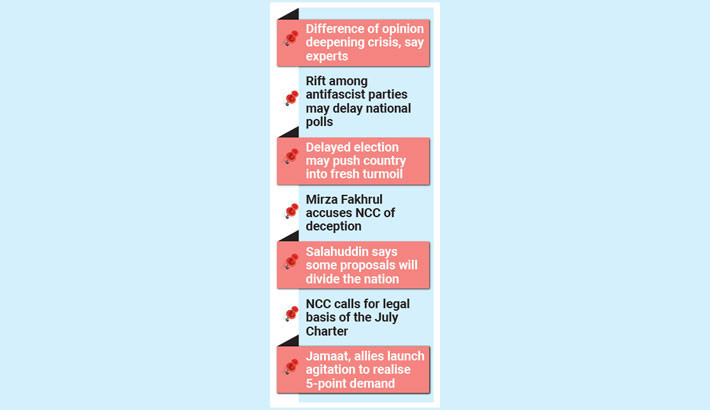
Bangladesh’s political atmosphere has once again turned tense following the submission of the long-awaited recommendations by the National Consensus Commission (NCC) to the interim government for implementing the July National Charter.
The move has sparked sharp divisions among political parties over key issues, including the proposed referendum.
Political experts warn that if these disagreements escalate and fuel unrest, the upcoming parliamentary election, billed for February next year, could face delays, potentially paving the way for the return of “fallen fascist forces” to the political scene.
In this situation, they said, the interim government must play a crucial role in easing tensions among antifascist parties and ensuring the national election is held on time to maintain peace and stability.
On Tuesday, the NCC submitted its recommendations to Chief Adviser Prof Muhammad Yunus for implementing the July Charter, advising the interim government to issue a Constitutional Order (CO) and hold a referendum either immediately before or on the day of the next general election.
It also suggested that the upcoming Jatiya Sangsad function in a dual capacity - both as Parliament and a Constituent Assembly - to complete the constitutional reforms.
BNP expresses discontent
BNP Secretary General Mirza Fakhrul Islam Alamgir has expressed strong dissatisfaction over the NCC recommendations, alleging that the commission failed to include their dissent notes.
“We are surprised to see the recommendations. We provided notes of dissent on issues we disagreed with, and the commission promised to record them. But those were not included. This is deception. It is a fraud on the people and on political parties,” he said while addressing a programme at the Jatiya Press Club on Wednesday.
Mirza Fakhrul further said the core of Bangladesh’s crisis lies in the need for a genuinely free and fair election. “The representatives of the parliament of people, to be elected through the election, will sort out these issues. If the election is delayed, the evil forces will only grow stronger. Those who want instability in Bangladesh are waiting for this opportunity.”
He urged the chief adviser to stay true to his commitment to the people. “You are now responsible to the nation. Deliver a credible election. The parliament formed through that election must resolve the crises. If you deviate from this goal, you will bear the full responsibility.”
Speaking at a round-table discussion, BNP Standing Committee Member Salahuddin Ahmed also voiced frustration, claiming that the NCC and the government are not acting impartially. “It seems the commission, the government, and two or three political parties are on one side, and I was playing against them,” he remarked.
He criticised the inclusion of 48 proposed constitutional amendments in a schedule for a national referendum, saying there had been “no real discussion” on these issues.
“The commission’s purpose was to establish consensus, but instead they have made proposals that will divide the nation and breed disunity,” he said, urging the interim government to act impartially so that people regain trust and national unity is preserved.
Jamaat, allies push for referendum first
Bangladesh Jamaat-e-Islami Nayeb-e-Ameer Syed Abdullah Mohammad Taher argued that if the national election is delayed, the referendum should be held first to ensure implementation of the July Charter.
“The referendum should precede the election, as the charter reforms are a separate process from electing state power,” he said. “If the date is announced in early November, the referendum can be held by the end of the month.”
Jamaat-led alliances, including several Islamist and right-leaning parties, have launched a new phase of movement with five major demands, including the immediate implementation of the July Charter and a referendum by November.
At a press conference at the Jatiya Press Club on Wednesday, Jamaat Secretary General Mia Golam Parwar said, “The longer the government delays the referendum, the greater the crisis surrounding the national election will be.”
The coalition’s other demands include introduction of the proportional representation (PR) system for both houses of parliament, ensuring a level playing field for all parties to guarantee a free and credible election, justice for oppression, persecution, massacres, and corruption under the previous fascist government and a ban on the political activities of the Jatiya Party and other 14-party alliance partners.
It announced plans to submit a memorandum to the Election Commission today, followed by broader protest programmes to be revealed at a 3 November press briefing.
Top leaders of Jamaat, Islami Andolan Bangladesh, Khilafat Majlish, Nezame Islami Party, Khilafat Andolan, JAGPA, and Bangladesh Development Party attended the event.
NCP wants July Charter implementation order first
National Citizen Party (NCP) Chief Coordinator Nasiruddin Patwary on Wednesday demanded that the government ensure the legal foundation of the July Charter and initiate the drafting and publication of a constitutional reform bill.
He said if the government issues the order providing the legal basis for the implementation of the July Charter, it will create progress towards the signing of the charter.
Experts warn of growing polarisation
Political scientist Prof Sabbir Ahmed of Dhaka University described the Islamist parties’ initiative as “a show of strategic strength.”
“They are trying to demonstrate their political relevance- to remind the BNP and others that they are significant players,” he told the Daily Sun. However, he warned that if divisions deepen among antifascist groups, “the situation will deteriorate.”
Economist and political analyst Prof Mahbub Ullah echoed the concern, saying, “There is no justification for delaying the election. Holding the polls on time is the only viable path for all political parties.”
Chief Adviser Prof Muhammad Yunus on Wednesday also acknowledged the challenges ahead, warning that “many forces, both domestic and foreign, may attempt to disrupt the upcoming national election.”
Despite preparations by the government and the EC to hold the polls in February, uncertainty looms large among the public.
Several citizens expressed anxiety about the rising political tension. “I’m worried that unrest might return before the election,” said Juwel Hossain, a private employee from Mirpur. “We just want stability and peace.”


